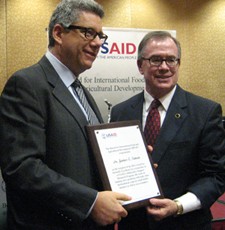Rutgers plant biologist Jim Simon wins prize for scientific excellence for African agricultural research funded by USAID
Simon helps small-scale farmers in Africa grow and market their produce
Jim Simon, professor in the Department of Plant Biology and Pathology at the Rutgers School of Environment and Biological Sciences, knows a lot about doing agricultural research and training work in Africa. In 1994, Simon began collaborating on multiple agricultural research projects in sub-Saharan Africa and initiated several small-scale farming initiatives that are bearing fruit today.
He has partnered with groups in the Cameroon, Ghana, Kenya, Liberia, Madagascar, Malawi, Namibia, Rwanda, Senegal, South Africa, Tanzania and Zambia. In concert with his African colleagues, Simon has trained blind farmers to raise food and helped them to create markets for their fresh produce by connecting them to the high-end hotels nearby. Access to other markets have followed suit.

On Oct. 16, in Des Moines, Iowa, the Board for International Food and Agricultural Development (BIFAD) presented Simon with its Scientific Excellence Award for his work in the USAID Horticulture Collaborative Research Support Program (CRSP). Simon was recognized for “his significant contributions to improving horticultural crops across the value-chain in several African countries." The BIFAD award singled out “his work [that] had an important impact upon thousands of small-holder farmers by connecting these farmers to higher-return markets.”
Reflecting on the magnitude of the award, Simon said, “I am just digesting it now as it comes as a surprise given that this national award includes all the universities involved in USAID CRSP programs, all of which are very strong and address constraints facing international—from regional and global economics and marketing to the large-scale breeding of wheat, rice, peanuts, corn, and addressing crises of insect and pest management to feeding millions of people.”
“I am indeed quite proud and humbled, and recognize it reflects not just my own work but all those with whom we’ve been collaborating,” added Simon.
He was nominated for this award by Elizabeth Mitcham, director of the Horticultural CRSP at the University of California-Davis, who praised Simon’s work. “Dr. Simon typically exceeds his own ambitious goals…His Ghana proposal planned to create direct jobs for 250 farmers and collectors …this one-year project…generated 350 direct jobs.” Mitcham also highlighted Simon’s Zambia project, stating that it “had similar success and exceeded expectations…using USAID money wisely with exceptional returns on investments.”
Simon served as the principal investigator for two previous Horticultural CRSP projects and is currently working on two similar projects, also funded by USAID. In one project, Simon is working with Zambian growers to improve production and post-harvest handing practices and access to cold chains. In Kenya, Tanzania and Zambia, Simon partners with Purdue University professor Stephan Weller on an “African Indigenous Vegetable” project to increase small-holder production and access to markets.
Professor Simon’s work exemplifies the Rutgers slogan, Jersey Roots, Global Reach, in that his leadership in international research and development seeks to improve the livelihoods of small-scale African farmers and processors through agriculture and agro-forestry.
Robert M. Goodman, executive dean of the School of Environmental and Biological Sciences praised Simon's work as an excellent example of the reach of Rutgers' innovative research making an impact around the world. “Dr Simon builds trust, confidence and excitement wherever he is engaged internationally…and has demonstrated creativity in bringing about long-lasting, sustainable improvements in international food and agriculture.”
Simon’s ability to build teams, to support African agriculture though education and training, to conduct science under tough conditions, and to bridge the different fields of botany, horticulture, agronomy, food science, phamacognosy—the study of medicines derived from natural sources—as well as product development, supply chain management and marketing have significantly contributed to the work’s success.
At Rutgers, Simon serves as director of the New Use Agriculture and Natural Plant Products Program and works closely with associate directors Rodolfo Juliani and Qing-Li Wu, of the Department of Plant Biology and Pathology and Ramu Govindasamy of the Department of Agricultural, Food, and Resource Economics.
Simon is nationally and internationally recognized as one of the leading horticultural, medicinal and aromatic plant authorities with specialization in natural projects and quality control. His area of expertise is in the development of new uses of traditional crops, new crop development, aromatic and medicinal plant domestication, with a specialization in natural products such as those containing extractable chemicals in interest for flavor, aroma, and medicinal activity. He currently spends significant time in Africa and most recently in Liberia, working with the University of Liberia and Cuttington University in support of another USAID-funded project, EHELD–Excellence in Higher Education for Liberian Development, as part of a larger international consortium led by RTI, International.
Professor Simon is a co-founder of the non-governmental organization AgriBusiness and Sustainable Natural African Plant Products (ASNAPP), which focuses on the use of indigenous plants by vulnerable and neglected populations as a vehicle for economic development. Through ASNAAP, Simon and his colleagues have generated over $25 million dollars of trade to growers and processors. They have simultaneously involved undergraduates, graduate and post-doctoral research associates at Rutgers and in Africa. The current Horticultural CRSP work, for which he received the BIFAD award, builds upon previous work conducted by Simon and colleagues at Rutgers and ASNAPP.
The BIFAD award ceremony was timed to coincide with the 2012 Borlaug Dialogue meetings and the World Food Prize events held annually in the month of October.
Media Contact: Paula Walcott-Quintin
848-932-4204
E-mail: quintin@aesop.rutgers.edu